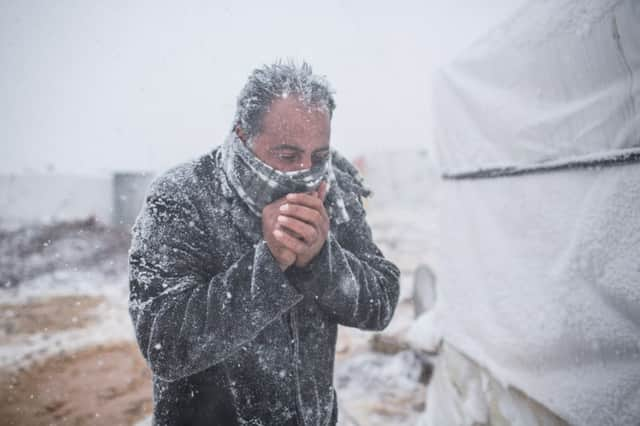Syrian refugees chilled by storm called Alexa


The snow has caused havoc across the region and grounded the start of a humanitarian airlift that was meant to take supplies from Iraq into the northeastern Kurdish areas of Syria.
In a tented settlement a few miles from the border in Lebanon’s Bekaa Valley, more than 1,000 people live in rudimentary shelters.
Advertisement
Hide AdAdvertisement
Hide AdRefugee Ibrahim, 27, spoke in his tent where the dirt floor had turned to mud and strong winds blew snow in the entrance. Children gathered in one corner around a fire in a metal crate.
“The storm will finish us. It’s freezing now. I seek refugee in God,” he said.
His family does not have enough money for food or to build a sturdier shelter.
Men filled bags with dirt to hold down tents and placed tyres and bricks atop the wooden structures to prevent the wind from tearing them apart.
In Lebanon, more that 835,000 refugees live in tented camps, unused buildings or with friends or family. The Lebanese government has decided not to house them in formal camps due to local sensitivities that they will stay permanently.
Aid agencies can help them with food, tents, blankets and clothes but they cannot set up formal refugee camps.
Ibrahim, who arrived last week, said the aid is not sufficient for the new arrivals.
“We came here in the winter but it would have been better if we had stayed in Syria. At least if you die, you die in your own house,” he said.
Advertisement
Hide AdAdvertisement
Hide AdSimon Ingram, a spokesman for the United Nations Children’s Fund, said the agency has been able to mobilise winter supplies for Syrians in the country and its neighbours but “the needs will outstrip what we and our partners are able to provide”.
The start of winter coincides with a polio vaccination campaign that seeks to protect 750,000 children in Lebanon after an outbreak of the disease was confirmed in eastern Syria in October.
“Polio spreads through water and sewage,” Mr Ingram said. “This is one the big dangers – overflowing drains.” Chief of Lebanon’s meteorological department, Mark Whaybeh, said that in past years, snow and rainfall had increased and temperatures decreased over December and into January.
“We are still at the beginning of the season,” he said. “We should have rain and cold periods during the next two months.”
Mr Whaybeh said Alexa will last until tomorrow night and that temperatures could plummet to minus seven degrees Celsius in some mountainous areas.
Minister for social affairs, Wael Abu Faour, said the government was “trying its best” and that the army had been called in to make refugee shelters ready for winter.
He said his main worry was that some refugees are living in a flood area near the Litani river.
Mr Abu Faour said he was trying to rehouse refugees near the river, which flooded during storms in January but that so far there was no place available.
Advertisement
Hide AdAdvertisement
Hide Ad“It’s beyond our capacity,” he said. “We tried mosques, we tried schools, we have tried everything. It will be a disaster.” Snowfall in Syria has not halted the fighting between rebels and forces loyal to president Bashar al-Assad which has killed more than 100,000 people in the past two-and-a-half years.
Footage filmed by opposition activists and posted to the internet this week showed the corpse of a baby they said had frozen to death in the central Syrian town of Rastan.
The weather has also forced the UN to cancel an airlift of food and winter supplies from Iraq to northeast Syria.